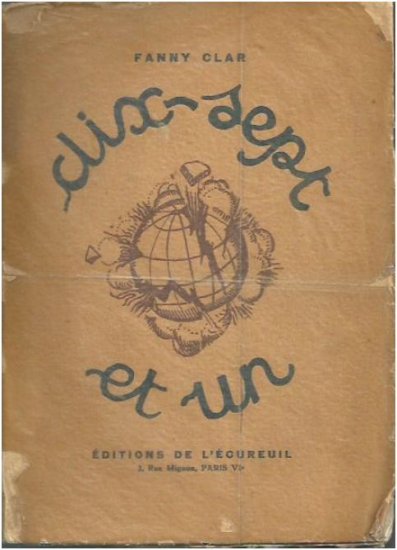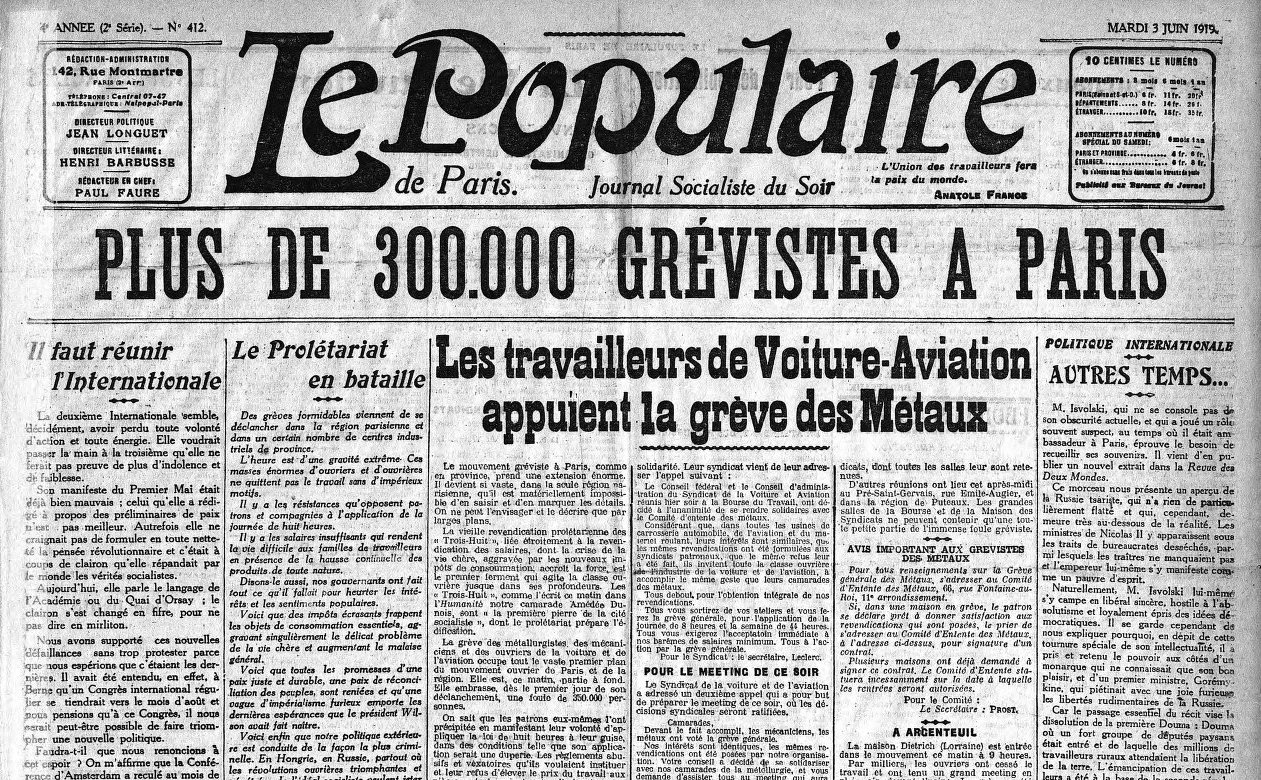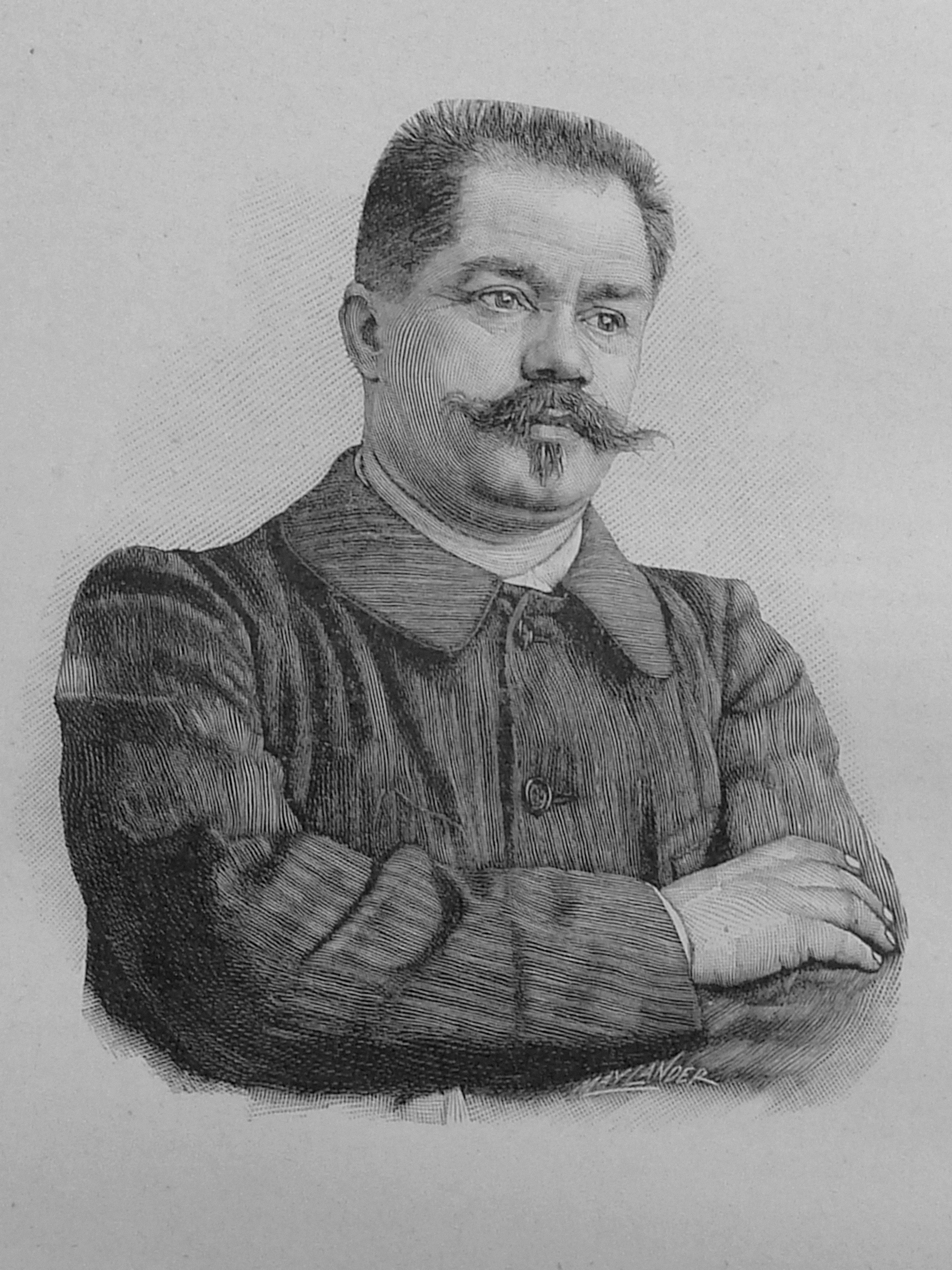|
Fanny Clar
Clara Fanny Olivier (February 17, 1875, 4th arrondissement of Paris – February 24, 1944), known by her pen name Fanny Clar, was a French journalist and writer, as well as a socialist intellectual (as defined by the French Section of the Workers' International (SFIO). She is also remembered for her commitment to pacifism and feminism. While her literary work includes novels, poems and plays, Clar primarily wrote stories for children. Early life Clara Fanny Olivier was born in Paris, February 17, 1875. She was the daughter of two opticians living on Avenue Victoria. Career In 1904, Clar contributed to ''Le Libertaire'' as "Francine". There she met Miguel Almereyda, the father of Jean Vigo, with whom she maintained contact. She participated in the (International League for the Rational Education of Childhood), founded by Francisco Ferrer in 1908. Beginning on August 21, 1912, and every week thereafter, in the antimilitarist newspaper she wrote a column for women titled "" (Our c ... [...More Info...] [...Related Items...] OR: [Wikipedia] [Google] [Baidu] |
4th Arrondissement Of Paris
The 4th arrondissement of Paris (''IVe arrondissement'') is one of the twenty arrondissements of the capital city of France. In spoken French, this arrondissement is referred to as ''quatrième''. Along with the 1st, 2nd and 3rd arrondissements, it is in the first sector of Paris, which maintains a single local government rather than four separate ones. The arrondissement, also known as Hôtel-de-Ville, is situated on the right bank of the River Seine. It contains the Renaissance-era Paris City Hall, rebuilt between 1874 and 1882. It also contains the Renaissance square of Place des Vosges, the overtly modern Pompidou Centre, and the lively southern part of the medieval district of Le Marais, which today is known for being the gay district of Paris. (The quieter northern part of Le Marais is within the 3rd arrondissement). The eastern part of the Île de la Cité (including Notre-Dame de Paris) and all of the Île Saint-Louis are also included within the 4th arrondissement. T ... [...More Info...] [...Related Items...] OR: [Wikipedia] [Google] [Baidu] |
Le Populaire (French Newspaper)
''Le Populaire'' was a socialist daily newspaper published in France. It was the main organ of the French Section of the Workers' International (SFIO). History and profile ''Le Populaire'' was founded in 1918.Martin, Marc. Médias et journalistes de la République'. Histoires, hommes, entreprises. Paris: Odile Jacob, 1997. p. 162 In 1927 the paper began to be published daily. ''Le Populaire'' was significantly weaker than its communist rival ''l'Humanité ''L'Humanité'' (; ), is a French daily newspaper. It was previously an organ of the French Communist Party, and maintains links to the party. Its slogan is "In an ideal world, ''L'Humanité'' would not exist." History and profile Pre-World Wa ...''. Only during the period of 1936-1937 did the circulation of ''Le Populaire'' exceed 100,000. With the German invasion of France in 1940, ''Le Populaire'' suspended publication. Although it was resumed after the war, it never regained its prominence of the late 1930s and wen ... [...More Info...] [...Related Items...] OR: [Wikipedia] [Google] [Baidu] |
Lucien Descaves
Lucien Descaves (16 March 1861– 6 September 1949) was a French novelist. Selected works * ''Le Calvaire de Héloïse Pajadou'' (1883) 'Héloïse Pajadou's Calvary.'' Sunny Lou Publishing , 2021 Further reading * * External links * * Archive oLucien Descaves Papersat the International Institute of Social History The International Institute of Social History (IISH/IISG) is one of the largest archives of labor and social history in the world. Located in Amsterdam, its one million volumes and 2,300 archival collections include the papers of major figu ... 1861 births 1949 deaths Writers from Paris 19th-century French novelists 20th-century French novelists Place of death missing French male novelists 19th-century French male writers 20th-century French male writers {{France-novelist-19thC-stub ... [...More Info...] [...Related Items...] OR: [Wikipedia] [Google] [Baidu] |
Clar Fanny Livre-1b644
Gloor is a family name which may refer to: * Cyrill Gloor (born 1982), Swiss footballer * Danny Gloor (born 1952), Canadian former ice hockey player * Kurt Gloor Kurt Gloor (8 November 1942 – 20 September 1997) was a Swiss film director, screenwriter and producer. He directed eleven films between 1967 and 1992. His 1976 film '' The Sudden Loneliness of Konrad Steiner'' was entered into the 26t ... (1942–1997), Swiss film director, screenwriter and producer * Mike Gloor (born 1950), American politician * René Gloor (born 1956), Swiss retired long jumper {{surname, Gloor ... [...More Info...] [...Related Items...] OR: [Wikipedia] [Google] [Baidu] |
L'Atalante
''L'Atalante'', also released as ''Le Chaland qui passe'' ("The Passing Barge"), is a 1934 French film written and directed by Jean Vigo, and starring Jean Dasté, Dita Parlo and Michel Simon. After the difficult release of his controversial short film ''Zero for Conduct'' (1933), Vigo initially wanted to make a film about Eugène Dieudonné, whom Vigo's father (anarchist Miguel Almereyda) had been associated with in 1913. After Vigo and his producer Jacques-Louis Nounez struggled to find the right project for a feature film, Nounez finally gave Vigo an unproduced screenplay by Jean Guinée about barge dwellers. Vigo re-wrote the story with Albert Riéra, while Nounez secured a distribution deal with the Gaumont Film Company with a budget of ₣1 million. Vigo used many of the technicians and actors who worked with him on ''Zero for Conduct'', such as cinematographer Boris Kaufman and actor Jean Dasté. It has been hailed by many critics as one of the greatest films of all time ... [...More Info...] [...Related Items...] OR: [Wikipedia] [Google] [Baidu] |
Vu (magazine)
''Vu'', stylized as ''VU'', was a weekly French pictorial magazine, created and directed by Lucien Vogel, which was published from 21 March 1928 to 29 May 1940; it ran for 638 issues. History ''Vu'' was the first large weekly to systematically feature photographs in essay form, and as such was an important precursor to, and proponent of, the magazine format of photojournalism (which came to prominence a decade after its print run in magazines such as ''Life'' and '' Look''). Innovation Although inspired in part by the German magazine ''Berliner Illustrirte Zeitung'', ''VU'' featured a constructivist aesthetic and was innovative in its layouts, especially in its double-page spreads, in which the layout artists were assisted by rotogravure from film positives of both type and halftone images which could be easily cut and arranged on a light box, rather than using less flexible and more expensive metal halftone blocks. Photography Notable contributing photographers include ... [...More Info...] [...Related Items...] OR: [Wikipedia] [Google] [Baidu] |
Le Soir
''Le Soir'' (, "The Evening") is a French-language Belgian daily newspaper. Founded in 1887 by Emile Rossel, it was intended as a politically independent source of news. It is one of the most popular Francophone newspapers in Belgium, competing with ''La Libre Belgique'', and since 2005 has appeared in Berliner format. It is owned by Rossel & Cie, which also owns several Belgian news outlets and the French paper '' La Voix du Nord''. History and profile ''Le Soir'' was founded as a free advertising newspaper in 1887. Later it became a paying paper. When Belgium was occupied during the Second World War, ''Le Soir'' continued to be published under German censorship, unlike many Belgian newspapers which went underground. The paper, which became known as "Le Soir Volé" (or "Stolen Le Soir"), was parodied by the resistance group, the ''Front de l'Indépendance'' which in 1943 published a satirical pro-Allied edition of the paper, dubbed the "Faux Soir" (or "Fake Soir"), which wa ... [...More Info...] [...Related Items...] OR: [Wikipedia] [Google] [Baidu] |
L'Obs
(), previously known as (1964–2014), is a weekly French news magazine. Based in the 2nd arrondissement of Paris, it is the most prominent French general information magazine in terms of audience and circulation. Its current editor is Cécile Prieur. History and profile The magazine was established in 1950 as ''L'Observateur politique, économique et littéraire''. It became ''L'Observateur aujourd'hui'' in 1953 and ''France-Observateur'' in 1954. The name ''Le Nouvel Observateur'' was adopted in 1964. The 1964 incarnation of the magazine was founded by Jean Daniel and Claude Perdriel. Since 1964, ''Le Nouvel Observateur'' has been published by Groupe Nouvel Observateur on a weekly basis and has covered political, business and economic news. It features extensive coverage of European, Middle Eastern and African political, commercial and cultural issues. Its strongest areas are political and literary matters and it is noted for its in-depth treatment of the main issues of t ... [...More Info...] [...Related Items...] OR: [Wikipedia] [Google] [Baidu] |
Société Des Gens De Lettres
Lactalis is a French multinational dairy products corporation, owned by the Besnier family and based in Laval, Mayenne, France. The company's former name was Besnier SA. Lactalis is the largest dairy products group in the world, and is the second largest food products group in France, behind Danone. It owns brands such as Parmalat, Président, Siggi's Dairy, Skånemejerier, Rachel's Organic, and Stonyfield Farm. History André Besnier started a small cheesemaking company in 1933 and launched its ''Président'' brand of Camembert in 1968. In 1990, it acquired Group Bridel (2,300 employees, 10 factories, fourth-largest French dairy group) with a presence in 60 countries. In 1992, it acquired United States cheese company Sorrento. In 1999, ''la société Besnier'' became ''le groupe Lactalis'' owned by Belgian holding company BSA International SA. In 2006, they bought Italian group Galbani, and in 2008, bought Swiss cheesemaker Baer. They bought Italian group Parmalat in a 2011 ... [...More Info...] [...Related Items...] OR: [Wikipedia] [Google] [Baidu] |
Demoralization (warfare)
Demoralization is, in a context of warfare, national security, and law enforcement, a process in psychological warfare with the objective to erode morale among enemy combatants and/or noncombatants. That can encourage them to retreat, surrender, or defect rather than defeating them in combat. Demoralization methods are military tactics such as hit-and-run attacks, such as snipers disturbing the enemy with less-lethal weapons and incapacitating agents, and intimidation such as display of force concentration. Some methods on the strategic scale are commerce raiding, strategic bombing, static operations such as sieges and naval blockades, and propaganda. Importance of morale Morale is often perceived as a necessary precursor to success in international relations. Success most often goes to those who believe in their cause, as they more easily maintain a positive outlook that helps them work harder for it.Angelo Codevilla and Paul Seabury, War: Ends and Means (Washington, D.C.: ... [...More Info...] [...Related Items...] OR: [Wikipedia] [Google] [Baidu] |
Defeatism
Defeatism is the acceptance of defeat without struggle, often with negative connotations. It can be linked to pessimism in psychology, and may sometimes be used synonymously with fatalism or determinism. History The term ''defeatism'' is commonly used in politics as a descriptor for an ideological stance that considers co-operation with the opposition party. In the military context, in wartime, and especially at the front, ''defeatism'' is synonymous with treason. Under military law, a soldier can be accused of being defeatist if he refuses to fight by voicing doubt of the ideological validity of national policy; thus, existential questions such as "Is the war already lost?" and "Is the fight worth the effort?" are defeatism that connote advocacy of an alternative end-to-the war other than military victory. "Defeatism" in Nazi Germany Defeatism became a buzzword in Germany following its capitulation in 1918, particularly among the Nazi Party led by Adolf Hitler, who routinely bl ... [...More Info...] [...Related Items...] OR: [Wikipedia] [Google] [Baidu] |
Louise Bodin
Louise Bodin (1877 – 3 February 1929) was a French feminist and journalist who became a member of the steering committee of the French Communist Party. Early years Louise Charlotte Bodin was born in 1877. Her father was a communard, but otherwise nothing in her background predestined her to become a revolutionary. She had a typical education for the period, and married a professor of medicine. Her husband, Eugène Bodin, was head of the faculty of medicine in Rennes, so they were well-to-do. This later earned her the sobriquet ''la bolchevique aux bijoux'' (the Bolshevik with jewelry) from her enemies, although her friends called her ''La bonne Louise'' (Good Louise). Rennes was a rough city at the turn of the century where alcoholism was endemic, there was no money for a girls' school, and the municipal council openly complained about the shortage of brothels. The second Dreyfus Trial was held in Rennes in 1899, and this profoundly affected Bodin. In March 1913 several women a ... [...More Info...] [...Related Items...] OR: [Wikipedia] [Google] [Baidu] |






